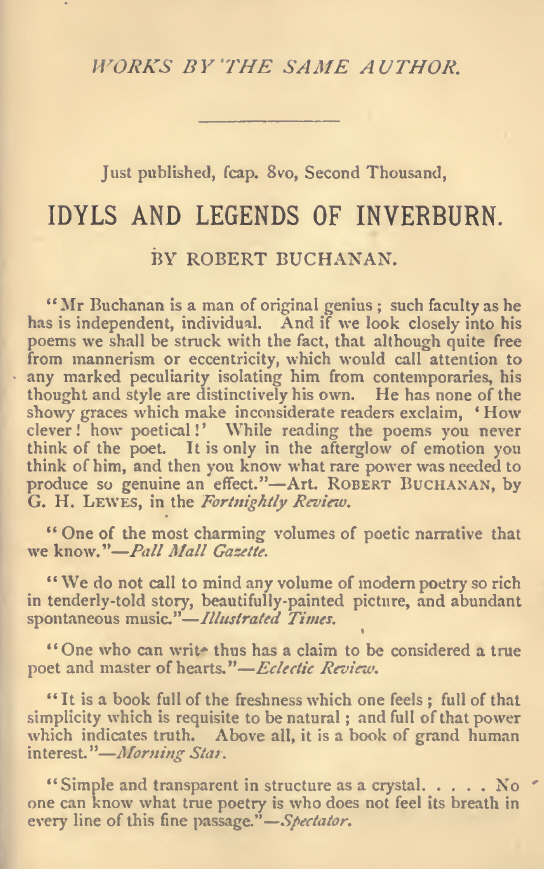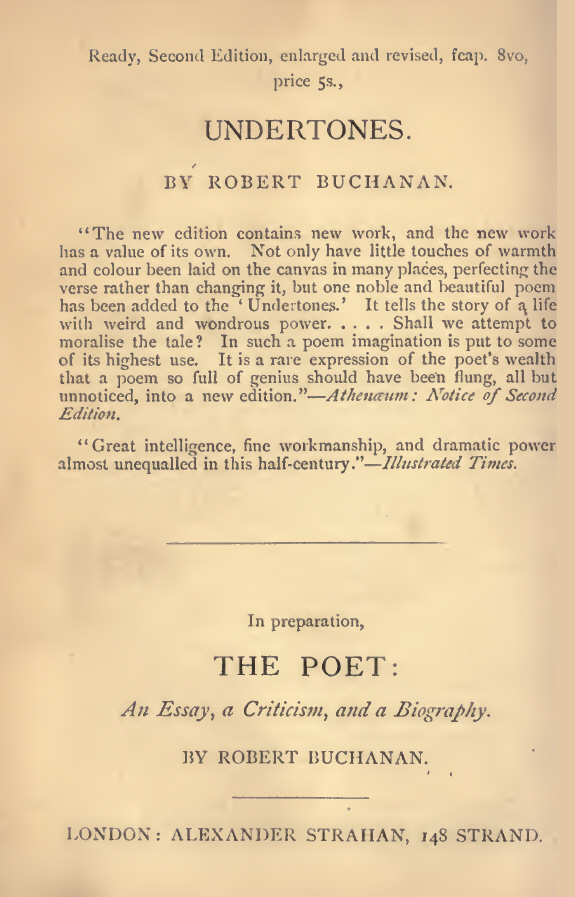ROBERT WILLIAMS BUCHANAN (1841 - 1901)
|
ROBERT WILLIAMS BUCHANAN (1841 - 1901) |
|
|
|
|
|
|
|
|
{London Poems 1866}
247
The hills close round her—everywhere
O LORD my God, draw not Thy hand away— What had I done, that Thou should pick me out, [2:1] But Angus lived—my white-faced sickly bairn, I never bedded with another man, For, though I hid the trouble from my bairn, Lord, thou wert sore upon me! I was lone, . . . It was a night . . . O bonnie, bonnie
[Notes:
256
Not in a mist of loveless eyes dies he,
CHORUS OF HOURS. 1. LO! here at the portal, awaiting new light,
2. The dark Earth sleepeth to our intoning,
3. Eos! Eos! thou canst not hear us,
4. Eos! Eos! thy cheek faint-gleaming
TITHONOS. What low, strange music throbs about my brain?
EOS. ’Tis the three sisters and their shadowy train,
TITHONOS. Methought that I was dead, and cold, and still,
EOS. It is enough to know thou canst not die,
TITHONOS. The seasons come and go, the moments fly 261 EOS. Nothing, be sure, can wholly pass away.
HOURS. Crow’s-nest on a yew-tree, swing slow in sad weather,
TITHONOS. Of death, corruption, change, and mystery,
EOS. Be at rest!
TITHONOS. What then remains, my soul, if this be so?
EOS. Around my neck I wind thy beard of gray, 263 HOURS. O clod of green mould, that wast lately a man,
TITHONOS. Thine eyes are lit with passion strong enew
EOS. Now, close thine eyes, lean heavy on my breast,
TITHONOS. Ah woe! ah woe!—and I am lost for aye!
EOS. Nothing, be sure, can wholly pass away!
HOURS. The stars are fading away in wonder,
EOS. It is Apollo! Hitherward he urges
TITHONOS. Ye brighten, O ye columns round about!
HOURS. 1. Our hearts beat quicker, we lift our voices, 270 2. Eos! Eos! the sound from under
3. Eos! Eos! all earth beholds thee,
4. Eos! Eos! the sound is louder!
[Notes:
271 OF A FEW SCOTTICISMS USED IN “THE SCAITH O’ BARTLE.” To avoid errors, (such as were not uncommon among readers of the “Idyls of Inverburn,”) let it be understood that the English equivalents given below merely express the meanings the Scotch words bear in the text, and which they are in all instances capable of bearing. Bickering, quarrelling. THE END.
__________ Ballantyne, Roberts, & Company, Printers, Edinburgh. |
 |
|||
 |
|||
|
(The additional ‘London Poems’ from the 1884 edition of The Poetical Works of Robert Buchanan.)
or back to London Poems - Contents
|
|
|
|
|
|
|